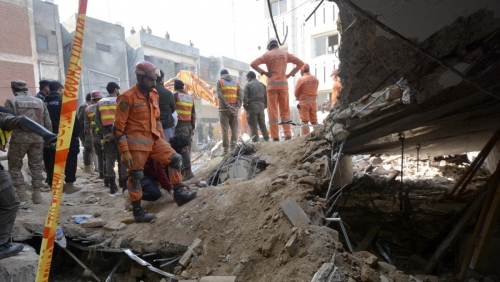Pakistan bombing raises fears over security breach as death toll climbs to 100
Agencies | Peshawar
The Daily Tribune – www.newsofbahrain.com
Pakistani authorities scrambled on Tuesday to determine how a suicide bomber was able to carry out one of the country’s deadliest militant attacks in years, unleashing an explosion in a crowded mosque inside a highly secured police compound in the city of Peshawar. The death toll from the blast climbed to 100.
Monday morning's bombing, which left at least 225 wounded, raised alarm among officials over a major security breach at a time when the Pakistani Taliban, the main anti-government militant group, has stepped up attacks, particularly targeting the police and the military.
In a televised speech to parliament Tuesday, Defence Minister Khawaja Mohammad Asif accused the Pakistani Taliban, known by the acronym TTP, of carrying out the attack, saying they were operating from neighbouring Afghan territory and demanding the Afghan Taliban take action against them. A TTP commander earlier claimed responsibility, but a spokesman for the group later distanced the TTP from the carnage, saying it was not its policy to attack mosques.
More than 300 worshippers were praying in the mosque, with more approaching, when the bomber set off his explosives vest, officials said. The blast blew off part of the roof, and what was left caved in, injuring many more, according to Zafar Khan, a police officer.
Rescuers worked through the night and into Tuesday morning, removing mounds of debris to reach worshippers still trapped under the rubble. The death toll rose as more bodies were found and several of the critically injured died, said Mohammad Asim, a government hospital spokesman in Peshawar.
Most of the victims were police officers, he said.
Counter-terrorism police are investigating how the bomber was able to reach the mosque, which is inside a walled-off police headquarters compound called Police Lines. The compound is located in a heavily security district of Peshawar that includes other government buildings.
“Yes, it was a security lapse,” said Ghulam Ali, the provincial governor in the Khyber Pakhtunkhwa province, of which Peshawar is the capital.
Akhtar Ali Shah, a former regional interior secretary once based in Peshawar, said it “was not a spur of the moment attack".
“It was the handiwork of a well-organized group,” he said, adding that those behind the attack must have had inside help to gain access to the compound and probably entered it several times for reconnaissance or even to plant explosives ahead of time.
“It’s not a security lapse, it’s a security breach,” he said. “From all entry points, there are multiple layers of security you have to cross” with ID checks.
US National Security Council spokesperson Adrienne Watson condemned the attack in Peshawar. “Terrorism is indefensible, and to target worshippers is unconscionable. The United States stands ready to provide support to Pakistan in its efforts to recover and rebuild," she said.
Speaking to parliament, Interior Minister Rana Sanaullah Khan said investigators suspect that the bomber was helped by someone from the families of government employees who live on the compound near the mosque. He said 97 of the 100 dead were members of the police and 27 police officers remain in critical condition.
The military’s media wing declined an Associated Press interview request for the chief of army staff. Asim Munir, who took office in November, has yet to do any media appearances.
Kamran Bangash, a provincial secretary-general with the opposition Pakistan Tehreek-e-Insaf party, blamed the instability on the government of Prime Minister Shahbaz Sharif.
The government “has failed to improve the economy and law and order situation, and it should resign to pave the way for snap parliamentary elections,” he said. The party’s leader, former Prime Minister Imran Khan, denounced the attack.
Sharif visited a hospital in Peshawar after the bombing and vowed “stern action” against those behind the attack. On Tuesday he dismissed criticism of his government and called for unity. “My message to all political forces is one of unity against anti-Pakistan elements. We can fight our political fights later,” he tweeted.
Shortly after the explosion, a Pakistan Taliban commander Sarbakaf Mohmand claimed responsibility for the attack in a post on Twitter.
But hours later, TTP spokesperson Mohammad Khurasani said it was not the group’s policy to target mosques, seminaries and religious places and that those taking part in such acts could face punitive action under TTP’s policy. His statement did not address why a TTP commander had claimed responsibility for the bombing.
Related Posts

